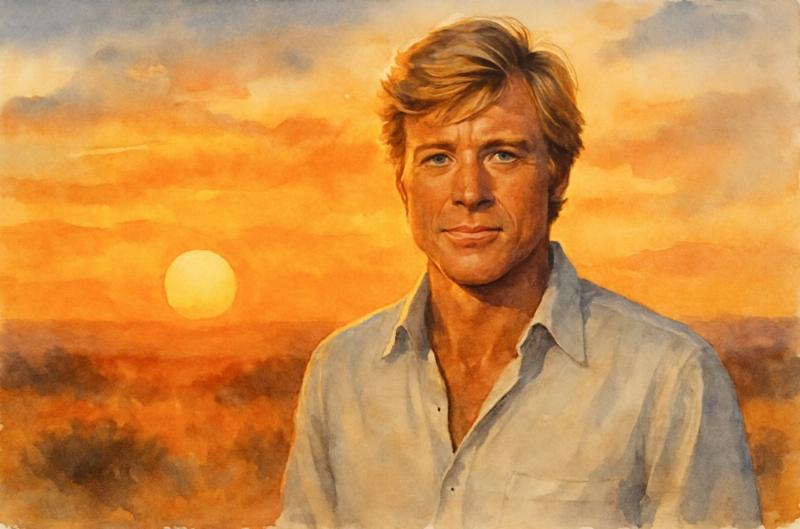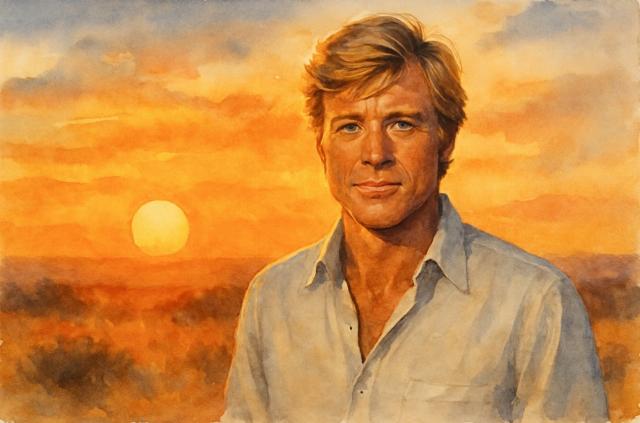


“In a way, he was like the country he lived in; everything came too easily to him. But at least he knew it.” — The Way We Were.
Robert Redford was the American Golden Boy whilst America was removing itself from the gold standard; the heir to the throne who had to be prodded to candidacy and whose consequent victory left him ambivalent in his ascendance.

Image created using AI.
The Way We Were identified Redford as the exemplar of mid-Empire American exceptionalism. This oft-graceless though great film from 1973 was a slice of instant nostalgia: a paean to a country blessed with inordinate natural wealth and beauty, happy in its isolation--yet compelled to enter the world stage and grapple with good, evil, and all the compromises in between. This was classic imperial liberalism of the American kind: white man’s burden and noblesse oblige tempered with the desire to just be left alone.
It was The Way We Were, released the year of OPEC embargoes, Vietnam disengagement, and Watergate hearings, that situated Redford as the avatar of his country: its subtextual thesis, that the post-war Communist witch-hunt began the eroding of American honor and righteousness. Redford’s next films would explore that (heavily inaccurate) notion.
Just a few years later, All the President’s Men, the 1976 dramatization of Woodward and Bernstein’s pursuit of the Watergate story, positioned Redford’s Woodward as all noblesse oblige, a great-looking, talented aristocrat, born for a royalty of crowns, robes, tux and tails—but who chose rumpled corduroy and an endless search for truth. Audiences in 1976 knew what this truth was: America was rotten from within, its only potential salvation to come from the Sam Spades of its day, journo/detectives of a sort, fearless in their navigation of the mean streets and basement garages of political power.
Today, after revelations about Mark Felt and the Russia Hoax, we can look back at the original and realize that the compromises and corruption went both ways. Woodward seems as specious a heroic figure as Nixon ever was: his motivations, omissions, and elisions, from that era through today, are now all in question. Every book and article of his, from his purported deathbed interviews of CIA directors to his bungled Belushi story, all the way to his curious disinterest in exploring a Nixon White House figure, Stefan Halper’s role in the Russia Hoax itself.
Fittingly, Redford soon retreated from playing the heroic roles himself, transitioning to a behind-the-camera force, his lead actor gigs dwindling over the next decades.
His directorial debut was the stunning Ordinary People, which saw him concentrate on the intricacies of an internal drama, a microcosmic depiction of America through the exemplar all-American success story family, unused to and unable to handle catastrophe.
Redford would successfully continue exploring ‘Redford is America’ in two subsequent directorial offerings, A River Runs Through It, and Quiz Show, using a young doppelganger, Brad Pitt, and Ralph Fiennes as his representations. Redford provides the narration of River, curiously as the Pitt character’s brother, perhaps in a bid to show the duality of man, or America, or Redford. The Fiennes character in Quiz was a man born to intellectual and societal greatness, yet prone to corruption and the easy way out.
Arguably, Redford’s greatest, though paradoxically perhaps his most colorless, role of his post-superstar stage was Roy Hobbs in The Natural. A 48-year-old Redford, as weathered as an outfielder’s glove, his fastball long gone, is content to let the movie wash over him: a passive, saintly presence. This is the promise of late-stage America: an older, wiser, and chastened empire, the wunderkind no more, content to hit the lights out one more time before its own lights would forever extinguish.
At around this time, Redford shifted his attention to creating the Sundance festival, celebrating and promoting independent filmmakers. Situated on property Redford purchased that had been the setting for some of Jeremiah Johnson, and named for his character in Butch Cassidy and the Sundance Kid, this was a fitting marriage of name, place, and aspirations. This was Redford as classic liberal America, the isolated, glorious, God-blessed setting enabling the recipients of his largesse to marry an independent ethos with a care for society.
Sundance was Redford was America: the sun seemed to dance for the person, the country that was born on third base, radiant from the heavenly-bestowed light, but cognizant that he and it hadn’t hit a triple, not yet. ‘Giving back’, producing a greater society, was the burden of this beautiful man, this beautiful country.
Four-plus decades later, one cannot get a film into Sundance without ticking off enough of the intersectional boxes. This is late-stage liberalism; this is Redford hectoring Trump like a less-pathetic De Niro. Wokeness in place of art.
In place of the blessed Redford bestowing upon the less fortunate in order to build a great society, a new deal for those born without the Sun dancing upon them, we have ‘progressed’ to. . . those born with the Sun dancing upon them must have stolen the Sun, must have used the poor and downtrodden to steal the Sun and shine it only upon them, and they’d better return the Sun or at least cease the oppression and pay reparations for the theft, and while you’re at it stop calling the victimizers names such as The Sundance Kid: that implies some sort of superiority.
Redford passed just as the extreme right and left coalesced around conspiracy theories about the assassination of Charlie Kirk. Robert Redford, an avatar for an entire country, rode off into the sunset and was barely noticed. The country had moved on, its mania and delusions running itself off the precipice, hurtling into the shattering rapids.
There are many on the sane right and left who will miss Robert Redford, a man to whom everything seemed to come too easily, but who, at least, knew it.
Norman Krieg, a pen name, thinks Ryan O’Neal could have been Redford but for some personal issues hampering his career.
